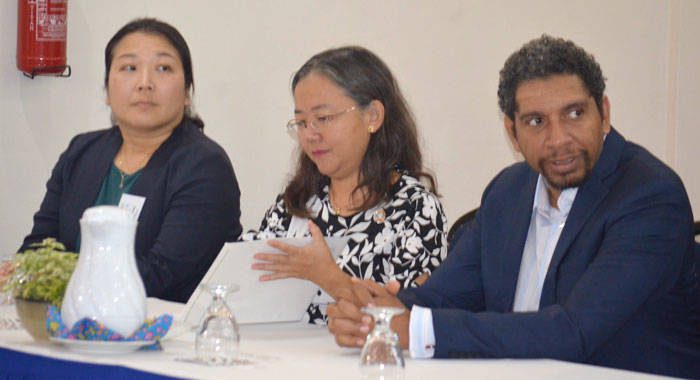Over 30 representatives from nine Caribbean countries met in Kingstown on Wednesday, to position themselves better to access funding for climate change mitigation.
Countries attending the workshop will use their Nationally Appropriate Mitigation Actions (NAMAs) to develop concept notes which will be presented to development partners, who will also be in attendance. During this workshop, actions and priority areas identified in NAMAs, will be under consideration by development partners.
NAMAs refer to any action that reduces emissions in developing countries and is prepared under the umbrella of a national governmental initiative.
The United Nations Development Programme’s Japan-Caribbean Climate Change Partnership (UNDP J-CCCP) has provided support for the development of NAMAs in seven Caribbean countries since 2017 in the transport, energy and water sectors, as one of the tools to implement countries’ Nationally Determined Contribution (NDC).
In his remarks at the opening of the workshop, the Minister of Finance, Economic Planning, Sustainable Development and Information Technology, Camillo Gonsalves noted the importance of climate financing for the region.
“We in the Caribbean are fighting a battle. We are among the most vulnerable yet, we are considered middle income countries and this disadvantages us when we seek financing,” he said.
Ad interim Resident Representative for the UNDP Barbados and the OECS Subregional Office, Chisa Mikami, said:
“This workshop is a great opportunity for our colleagues to learn more about accessing funding for very necessary processes and advancements, with the added value of learning from peers and, having donors on hand to provide guidance.”
The J-CCCP partnered with the Enabling Gender-Responsive Disaster Recovery, Climate and Environmental Resilience in the Caribbean (EnGenDER) Project, as well as development partners, to host this workshop.
The J-CCCP is a regional initiative working in eight Caribbean countries.
The programme of work under the J-CCCP is in line with the Paris Agreement on Climate Change, to keep global warming below 2 degrees Celsius and to drive efforts to limit the temperature increase even further to 1.5 degrees Celsius above pre-industrial levels.
Climate change is one of the most serious challenges to the Caribbean, and as such boosting resilience is crucial for the region’s development and is a clear part of UNDP’s global strategic plan of programme priorities. Agriculture, fisheries, water and sanitation, human health and coastal resources and infrastructure are all being affected by climate change and require responses at both community and national levels in the region.







It is shortsighted to argue that, “Agriculture, fisheries, water and sanitation, human health and coastal resources and infrastructure are all being affected by climate change and require responses at both community and national levels in the region” when each of these areas is more profoundly affected by strictly local factors that the government has refused to deal with like:
1. Overuse of poisonous chemicals by farmers.
2. Cutting down of the interior and King’s Hill rainforest by traditional farmers and ganja growers.
3. Destruction of the rainforest by tree cutters leading to increased greenhouse gasses.
4. The poisoning of rivers by garbage dumping and chemical runoff.
5. Unregulated beach sand mining destroying this natural barrier to rising seas and storms.
6. Then burning of garbage, including the burning of rubber tires by the governments exacerbating the global affects of alleged climate change.
7. Unregulated squatting and house building in gutters, ravines, and riversides.
These micro factors have lead to far greater environmental degradation and climate anti-mitigation than alleged global climate change ever has.
Very good list C. Ben. I wish the Government would also consider your list instead of just thinking up ways to take the taxpayer’s money, money money! I only question your “3” because the tern “Greenhouse gases” is not agreed upon by real scientists. As I have said, CO2 levels are low at present not high as the fake scientists claim. According to Polar Ice Samples, CO2 levels have been much higher in the past, and far higher before the Industrial Revolution. It has instead been approved by the US Government to shower the Earth with Toxic Chemicals to reflect sunlight. The US also thinks it is fine to continue pumping toxic chemicals into the Earth for “Fracking”. They believe Methane Gas is fine but CO2 is not. The entire agenda is designed to get more money from the peoples. The Rothschilds and Rockefellers are the biggest financial contributors to the Climate Change Agenda, and these are the biggest owners of the Fossil Fuel Industry.
They will do little to address your list because the goal is primarily to get more money from the people, not to sustain the environment!